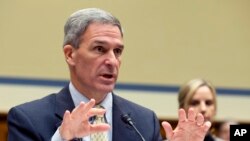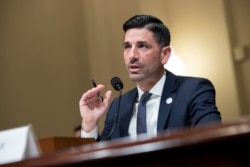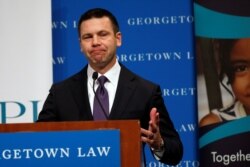After a federal court ruled this week that Ken Cuccinelli’s appointment as acting director at U.S. Citizenship and Immigration Services (USCIS) was not legal, experts told VOA that immigration directives issued under his signature are now vulnerable.
U.S. District Judge Randolph Moss's ruling on Cuccinelli's appointment vacated a policy that gave asylum-seekers less time to prepare for screening interviews in the United States.
Immigration law experts say the broader question then becomes whether other guidelines approved by Cuccinelli can also be challenged.
"I think it does call into question all of his policies. I think the challenge is [to find out] which policies are under his name, and which policies are more broadly issued — or maybe prompted by him, proposed by him — but ultimately issued by the Department of Homeland Security,” Sarah Paoletti, professor at the University of Pennsylvania Carey Law School, told VOA.
Paoletti, founder of the Transnational Legal Clinic, said they are looking into other directives such as proposed fees for asylum applications and rescinding work authorization for asylum-seekers.
The legal challenge was brought on behalf of five Hondurans after Cuccinelli reduced the consultation window before credible-fear interviews from 48 or 72 hours to "one full calendar day from the date of arrival at a detention facility."
Moss ruled the USCIS cases for the five Hondurans should be remanded to the agency for further proceedings, but Moss did not extend any kind of relief to others whose cases have been denied.
The judge said Cuccinelli was not legally the first assistant to the director of USCIS under the Federal Vacancies Reform Act (FVRA) and could not be named acting director.
Cuccinelli, an immigration hardliner who was previously attorney general in Virginia, is an appointee of President Donald Trump and serves as USCIS’s principal deputy director.
"I think the question is going back to figuring out what's in the mix and what's not. Will they reissue [voided policies] with the signature of the Department of Homeland Security?” Paoletti asked.
Cuccinelli told Fox News that directives would be "effectively reissued and validated."
The “better course,” according to Carl Tobias, professor at the Richmond School of Law, is to nominate Cuccinelli for something, “which apparently the president doesn't want to do. … The administration from their perspective is perfectly happy to have him continue forward while they litigate this matter.”
Tobias told VOA that Moss’s order, though a narrow opinion, was “well-reasoned.”
"But it has much broader implications, and I think that's what people are interested in," Moss said. "So, we'll see how that plays out with other issues and public charge cases and others that are related.”
Tobias added that it might be difficult to trace some of the immigration directives for which Cuccinelli was responsible.
Government expected to appeal
At a March 3 hearing of the House Homeland Security Committee, Department of Homeland Security Acting Secretary Chad Wolf said government lawyers were expected to file an appeal after the district court ruling.
U.S. Representative Kathleen Rice of New York, chairwoman of the subcommittee on border security, facilitation and operations, asked Wolf why Cuccinelli remained in a position that violated the Federal Vacancies Reform Act (FVRA).
Wolf replied that DHS officials were “taking a look at determining what to do with those limited decisions that [Cuccinelli] had signed out.”
Most senior roles at DHS and its subagencies have acting officials, including secretary, deputy secretary and chief financial officer. Also on acting titles are the director of Immigration and Customs Enforcement, commissioner of U.S. Customs and Border Protection and director of USCIS.
According to court documents, Lee Francis Cissna, then the Senate-confirmed director of USCIS, resigned June 1, 2019. Under FVRA, Cissna's “first assistant,” deputy director Mark Koumans, was expected to automatically assume the post of acting director.
Nine days after Cissna’s resignation, Kevin McAleenan, the acting secretary of homeland security at the time, appointed Cuccinelli “to serve as the principal deputy director of USCIS” — a position that court documents say did not exist before Cuccinelli’s appointment.
McAleenan revised USCIS’s order of succession, designating the newly created position of principal deputy director as “the first assistant and most senior successor to the director of USCIS.”
These two changes, documents show, took place after Cissna’s resignation, and allowed Cuccinelli to pass Koumans to become USCIS acting director.
A spokeswoman for the Department of Homeland Security, Heather Swift, said, "We obviously disagree with the court's opinion, and are looking more closely at it."






